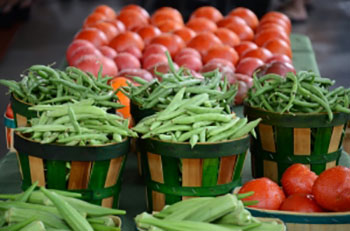Apply Now for 2024 Specialty Crop Block Grants
Feb 27, 2024

The Tennessee Department of Agriculture (TDA) is now accepting applications for the United States Department of Agriculture (USDA) Specialty Crop Block Grant Program (SCBGP).
“Given the variety of thriving crops in Tennessee, we are pleased to offer this program aimed at amplifying the production and competitiveness of specialty produce,” Agriculture Commissioner Charlie Hatcher, D.V.M. said. “This program supports organizations of all sizes with initiatives spanning from pioneering research and educational initiatives to comprehensive market studies.”
SCBGP supports initiatives that directly affect multiple Tennessee producers and provide a learning foundation for future generations of specialty crop growers. Producers, universities, institutions, cooperatives, industry, and community-based organizations are eligible to apply. Specialty crops include fruits and vegetables, dried fruits, tree nuts, honey, ornamental plants, and other nursery crops.
To submit a proposal, download and complete the 2024 project template. Applicants must email completed paperwork to tn.scbg@tn.gov no later than close of business on March 15, 2024. First-time recipients have a funding limit of $25,000.
The project template and performance measures are available online at www.tn.gov/agriculture/businesses/business-development/scbg.html. For more information about SCBGP, email tn.scbg@tn.gov.
For more content like this, check out the latest issue of The Cooperator.
“Given the variety of thriving crops in Tennessee, we are pleased to offer this program aimed at amplifying the production and competitiveness of specialty produce,” Agriculture Commissioner Charlie Hatcher, D.V.M. said. “This program supports organizations of all sizes with initiatives spanning from pioneering research and educational initiatives to comprehensive market studies.”
SCBGP supports initiatives that directly affect multiple Tennessee producers and provide a learning foundation for future generations of specialty crop growers. Producers, universities, institutions, cooperatives, industry, and community-based organizations are eligible to apply. Specialty crops include fruits and vegetables, dried fruits, tree nuts, honey, ornamental plants, and other nursery crops.
To submit a proposal, download and complete the 2024 project template. Applicants must email completed paperwork to tn.scbg@tn.gov no later than close of business on March 15, 2024. First-time recipients have a funding limit of $25,000.
The project template and performance measures are available online at www.tn.gov/agriculture/businesses/business-development/scbg.html. For more information about SCBGP, email tn.scbg@tn.gov.
For more content like this, check out the latest issue of The Cooperator.